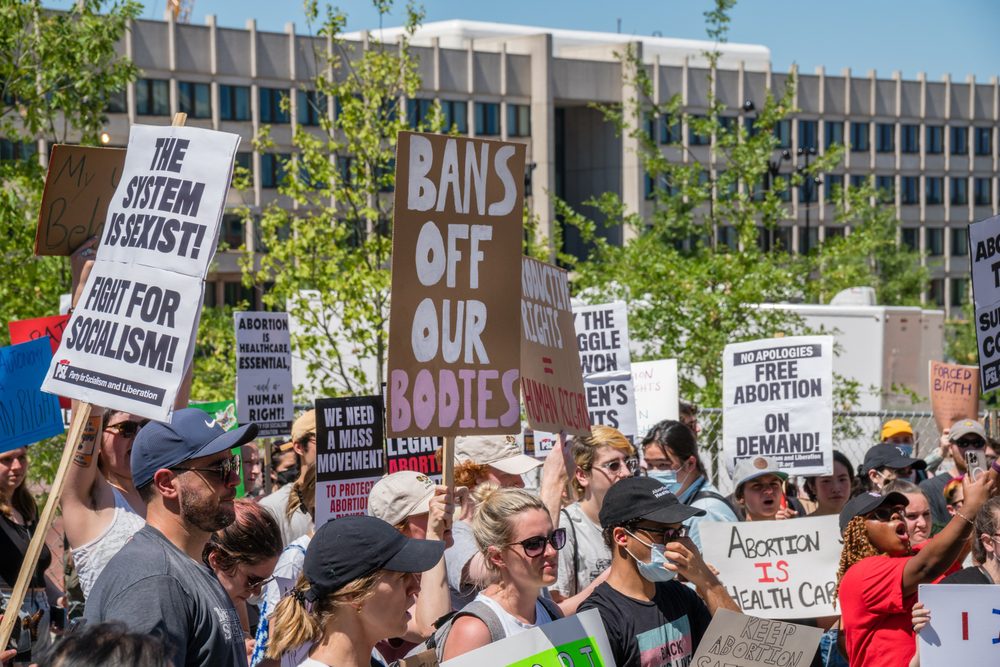
As Election Day gets closer, Floridians are preparing to cast their votes on one of the most important issues in the state: abortion rights.
Amendment 4, also known as the Right to Abortion Initiative, seeks to establish a constitutional protection for abortion in Florida up to the point of viability, generally around 22-24 weeks—and effectively overturn the current six-week ban in effect since May. The amendment requires 60% support to pass and has generated a heated debate, including among students, faculty, and the broader community at Florida Atlantic University (FAU) in Boca Raton, Florida.
Defending autonomy and gender equality
Jane Caputi, a professor at FAU’s Center for Women, Gender, and Sexuality Studies, argued that reproductive freedom is essential to women’s autonomy and gender equality. Caputi emphasized that abortion and contraception access have allowed women to make choices about their futures, influencing every sphere of their lives, from education to economic stability.
“When women cannot have authority over their own bodies and childbearing capacities, they lose control of their lives and some of their most basic rights, including the right to privacy, education, and dignity,” she explained. “Women’s full access to reproductive health care, which can include contraception and abortion, are key aspects of women’s freedom and are imperative to establishing gender equality.”
In fact, various studies show that the approval of the first oral contraceptive by the US Food and Drug Administration (FDA) in 1960 gave women control over their reproductive health care, which led to an economic and social shift. With this control, women could focus on building their careers, leading to a more competitive workforce.
Caputi pointed out that women’s reasons for seeking abortions vary, often extending beyond immediate personal or medical needs.
“Many women cannot afford a baby or may be dealing with relationship issues, including abuse,” she said. “About 40% of women who seek abortions have completed childbearing.”
She argued that the amendment offers Floridians the opportunity to restore reproductive rights at a time when, in her view, government overreach is infringing on women’s health and freedom.
The professor also explained what she considers broader social implications of restricting reproductive rights.
“What is happening now is a backlash against this progress, with some desiring to reinstitute a determinedly patriarchal society — one that demands only male leadership and gender hierarchy, not equality,” Caputi said.
Students’ perspectives
Among FAU students, opinions on Amendment 4 vary significantly, often influenced by personal backgrounds and values.
Kalila Leonard, a political science and sociology major, sees the amendment as a necessary step toward ensuring women’s rights in Florida.
“The government does not belong in a woman’s exam room in a hospital,” Leonard said.
She also pointed out that the current six-week limit is insufficient, as many women don’t know they’re pregnant by that time.
When asked about her thoughts on college students’ engagement with this initiative, she said that some students may avoid discussing the issue openly due to religious or cultural reasons.
“A lot of women are pro-choice but may not even realize it,” she added, suggesting that sometimes public opinion might not really reflect what people are thinking or their real positions.
Rae Turner, a freshman who hasn’t decided on a major, says she isn’t sure yet if she will vote for or against the amendment.
“I don’t really have a clear idea of what I think. I’m pro-choice. So, I believe that everyone should have a choice to decide if they want to carry out a pregnancy. But I feel like I have to do more research to decide how to vote,” she said.
David Linares, a political science major and member of FAU’s conservative student group Students for Life, has a different opinion. Linares believes the government has a duty to regulate abortion.
“All human lives are valuable and should be protected by the Constitution,” he argued.
Linares drew parallels between abortion bans and the abolition of slavery.
“The southern states lost their right to decide if slavery was legal because it was immoral,” he said. “In the same way, we believe the state has a responsibility to protect the unborn.”
Individual decisions and government’s role
State Rep. Robin Bartleman, a Democrat representing District 103, shared the deeply personal story of her own complicated pregnancy, describing it as “an incredibly difficult and personal decision.”
As a special education teacher, she had hoped to give her daughter a sibling through a “much wanted pregnancy.” However, when she learned that the fetus was nonviable, she and her then-husband faced an emotional decision, weighing what was best for their family. Ultimately, the pregnancy ended naturally.
Reflecting on the experience, Bartleman emphasized, “The only people that belonged in that exam room were me, my husband, my doctor, and my daughter. And the governor and the Florida legislature had no business in that room.”
Bartleman criticized Florida’s six-week ban, which she sees as an extreme restriction.
“Most women don’t even know they’re pregnant by six weeks,” she said, describing the ban as effectively blocking most abortion access in the state. The representative encouraged young voters to get informed and particularly understand the risk to women’s health if restrictive laws lead to delayed or denied medical care in cases of miscarriage or fetal abnormalities.
“No one should be at risk of dying because of a miscarriage,” Bartleman said.
State Rep. Jervonte Edmonds, who represents District 88 in Florida, also voiced his support for Amendment 4.
“The first thing is I am very proud of Floridians for galvanizing and being able to come together to petition to get this amendment on the ballot. It shows the strength of our Floridians and the power of democracy, that even when the government is not performing the way it should, that people can come together and make a change collectively,” he said.
Edmonds sees the amendment as a response to what he described as “harsh legislation” that has eroded women’s rights.
“Those in the super majority have proposed for decades now to reduce women’s rights. I believe it needs to pass, and unfortunately when it does pass, the Legislature cannot loosen any more restrictions on abortion, but it’s something that needs to be done,” he said.
Challenges of political engagement on campus
While the amendment holds significant implications for Florida’s future, some FAU students seem disengaged or uncertain about the issue. This apathy concerns state representatives and activists, especially given that college-aged women (20-24 years old) represent the demographic with the highest rate of unintended pregnancies, according to data from the US Centers for Disease Control and Prevention .
According to state Sen. Lori Berman, many young voters are unaware of the state’s current six-week ban and mistakenly believe they can access abortion services later in pregnancy.
“We need to get the word out to college students,” Berman said.
She criticized the lack of comprehensive sexual education in Florida, pointing to the state’s emphasis on abstinence-only education as a contributing factor to unintended pregnancies.
“Abortions should be safe and rare, and the only way to achieve that is by providing proper sexual education,” Berman argued. “But the state has failed in that regard.”
State Rep.Edmonds echoed Berman’s concerns, highlighting that political discourse can often feel inaccessible to young voters.
“Politicians talk over people’s heads, which confuses them and leads to disengagement,” Edmonds said.
He suggested that simplifying legislative language could help more students understand what’s at stake.
“This amendment gives women back their right to choose. That’s the bottom line,” he said.
What lies ahead
As November gets closer, both sides of the debate are intensifying their efforts to mobilize voters. For proponents like Bartleman and Berman, passing Amendment 4 is a critical step toward securing women’s reproductive rights and preventing future legislation that could completely outlaw abortion in Florida.
For opponents like Linares and the Students for Life group, it represents a moral stand against what they view as the loss of innocent lives.
Whether they vote “yes” or “no,” students, faculty, and community leaders who spoke to Floricua agree that the decision ahead is historic.
RELATED: Kamala Harris wants to end the Senate filibuster to restore national abortion rights
Are you ready to vote? Make sure to check your voter registration status, see who’s on your ballot, and make a voting plan here.

Harris says nation must accept election results while urging supporters to keep fighting
Harris delivered her remarks at Howard University, her alma mater and one of the country's most prominent historically Black schools, in the same...

What happens next? A timeline of the process between voting and inauguration
Here's what happens next, from the moment the last vote was cast to Inauguration Day on Jan. 20, 2025—no conspiracy theories, no unfounded claims,...

Florida’s wildfire season: What you need to know
Discover Florida's year-round wildfire risks, contributing factors, and prevention strategies, plus key historical events and community awareness....

Decline of Florida’s citrus industry hastened by Trump’s tariff tiff
Hurricanes and disease have already taken a tremendous toll on those fragrant trees, not to mention development demand for the land. This weekend I...




